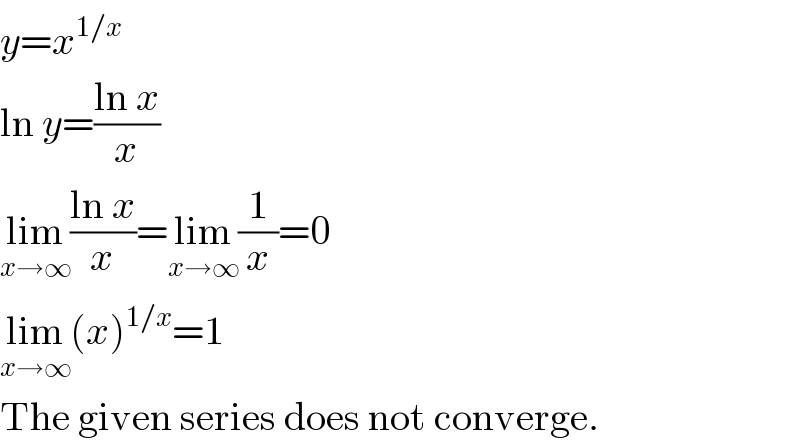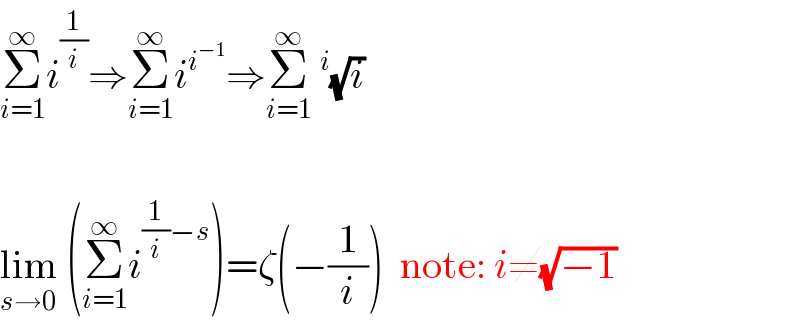
Question Number 3022 by Rasheed Soomro last updated on 03/Dec/15

$$\mathrm{Determine} \\ $$$$\mathrm{1}+\mathrm{2}^{\frac{\mathrm{1}}{\mathrm{2}}} +\mathrm{3}^{\frac{\mathrm{1}}{\mathrm{3}}} +... \\ $$
Commented by prakash jain last updated on 04/Dec/15

$${y}={x}^{\mathrm{1}/{x}} \\ $$$$\mathrm{ln}\:{y}=\frac{\mathrm{ln}\:{x}}{{x}} \\ $$$$\underset{{x}\rightarrow\infty} {\mathrm{lim}}\frac{\mathrm{ln}\:{x}}{{x}}=\underset{{x}\rightarrow\infty} {\mathrm{lim}}\frac{\mathrm{1}}{{x}}=\mathrm{0} \\ $$$$\underset{{x}\rightarrow\infty} {\mathrm{lim}}\left({x}\right)^{\mathrm{1}/{x}} =\mathrm{1} \\ $$$$\mathrm{The}\:\mathrm{given}\:\mathrm{series}\:\mathrm{does}\:\mathrm{not}\:\mathrm{converge}. \\ $$
Commented by Filup last updated on 03/Dec/15

$$\underset{{i}=\mathrm{1}} {\overset{\infty} {\sum}}{i}^{\frac{\mathrm{1}}{{i}}} \Rightarrow\underset{{i}=\mathrm{1}} {\overset{\infty} {\sum}}{i}^{{i}^{−\mathrm{1}} } \Rightarrow\underset{{i}=\mathrm{1}} {\overset{\infty} {\sum}}\:^{{i}} \sqrt{{i}} \\ $$$$ \\ $$$$\underset{{s}\rightarrow\mathrm{0}} {\mathrm{lim}}\:\left(\underset{{i}=\mathrm{1}} {\overset{\infty} {\sum}}{i}^{\frac{\mathrm{1}}{{i}}−{s}} \right)=\zeta\left(−\frac{\mathrm{1}}{{i}}\right)\:\:\mathrm{note}:\:{i}\neq\sqrt{−\mathrm{1}} \\ $$
Commented by Rasheed Soomro last updated on 03/Dec/15

$$\mathcal{D}{idn}'{t}\:{understand}.\:\mathcal{T}{ry}\:{again}\:{please}! \\ $$
Commented by Filup last updated on 04/Dec/15

$$\mathrm{Because}\:\mathrm{the}\:\mathrm{given}\:\mathrm{serious}\:\mathrm{converges} \\ $$$$\mathrm{to}\:\mathrm{value}\:\mathrm{1}\:\left({i}^{−{i}} \:\:{not}\:{S}\right),\:\mathrm{the}\:\mathrm{series}\:\mathrm{at}\:{i}\rightarrow\infty \\ $$$$\mathrm{is}\:\mathrm{about}\:\:...\mathrm{1}+\mathrm{1}+\mathrm{1}+\mathrm{1}+... \\ $$$$\mathrm{with}\:\mathrm{each}\:\mathrm{value}\:\mathrm{getting}\:\mathrm{closer}\:\mathrm{to}\:\mathrm{1}. \\ $$$$\mathrm{This}\:\mathrm{makes}\:\mathrm{the}\:\mathrm{series}\:\mathrm{not}\:\mathrm{limit}\:\mathrm{to}\:\mathrm{a}\:\mathrm{single} \\ $$$$\mathrm{value}. \\ $$$$ \\ $$$$\mathrm{Hence}\:\mathrm{showing}\:\mathrm{evidence}\:\mathrm{that}\:\zeta\left(−\frac{\mathrm{1}}{{i}}\right)=\infty \\ $$$$\mathrm{and}\:{S}_{\mathrm{2}} \:\mathrm{in}\:\mathrm{some}\:\mathrm{cases} \\ $$
Commented by prakash jain last updated on 04/Dec/15

$$\mathrm{A}\:\mathrm{series}\:\mathrm{S}=\underset{{n}=\mathrm{1}} {\overset{\infty} {\sum}}{a}_{{n}} \:\mathrm{converges}\:\mathrm{only}\:\underset{{n}\rightarrow\infty} {\mathrm{lim}}{a}_{{n}} =\mathrm{0}. \\ $$$$\mathrm{This}\:\mathrm{is}\:\mathrm{necessary}\:\mathrm{condition}. \\ $$
Commented by Rasheed Soomro last updated on 04/Dec/15

$$\mathcal{T}\boldsymbol{{hank}}{S}! \\ $$
Answered by Filup last updated on 03/Dec/15

$$\mathrm{for}\:{S}=\zeta\left(−{s}\right),\:{S}\rightarrow\infty \\ $$$$\mathrm{There}\:\mathrm{maybe}\:\mathrm{be}\:\mathrm{an}\:\mathrm{analytical} \\ $$$$\mathrm{approach}\:\mathrm{such}\:\mathrm{as}\:\zeta\left(−\mathrm{1}\right)=\Sigma\mathbb{N}^{+} =−\frac{\mathrm{1}}{\mathrm{12}} \\ $$$$ \\ $$$$\mathrm{My}\:\mathrm{unproven}\:\mathrm{solution}\:\mathrm{would}\:\mathrm{be}\:\mathrm{that} \\ $$$$\mathrm{for}\:{S}=\underset{{i}=\mathrm{1}} {\overset{\infty} {\sum}}{i}^{\frac{\mathrm{1}}{{i}}} =\zeta\left(−\frac{\mathrm{1}}{{i}}\right) \\ $$$${as}\:\:{i}\rightarrow\infty,\:{S}\rightarrow\infty \\ $$$$ \\ $$$$\mathrm{So},\:\mathrm{I}\:\mathrm{would}\:\mathrm{suggest}\:\mathrm{that} \\ $$$${S}=\left\{\infty,\:{S}_{\mathrm{2}} \right\} \\ $$$$\mathrm{Where}\:\:{S}_{\mathrm{2}} \:\:\mathrm{is}\:\mathrm{an}\:\mathrm{analytical}\:\mathrm{solution} \\ $$
